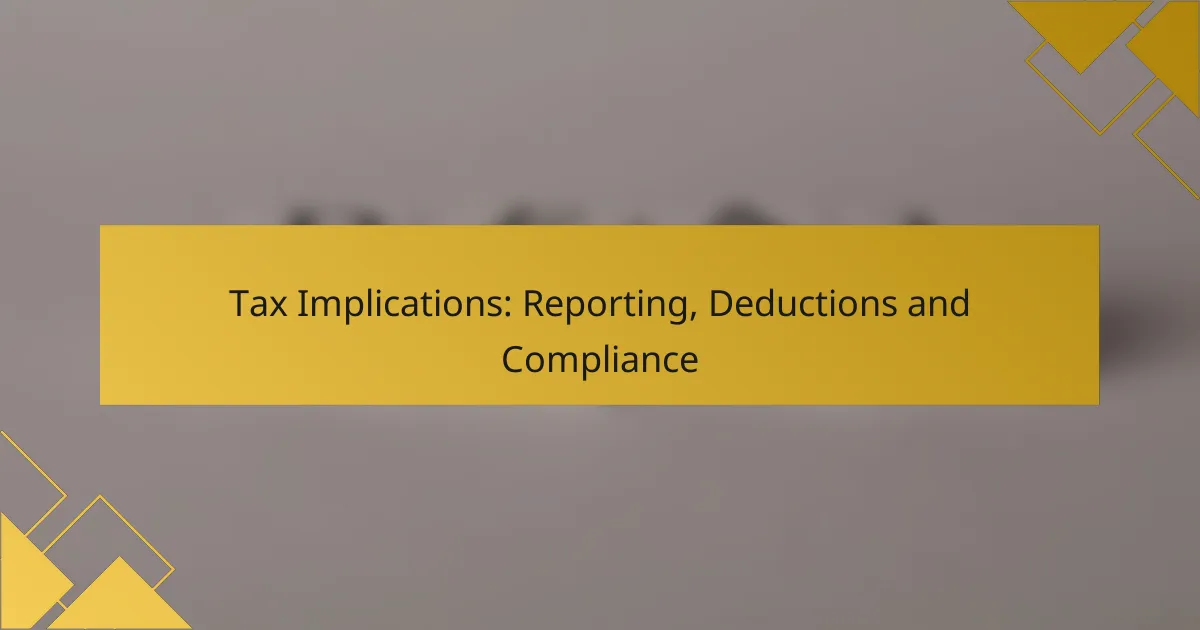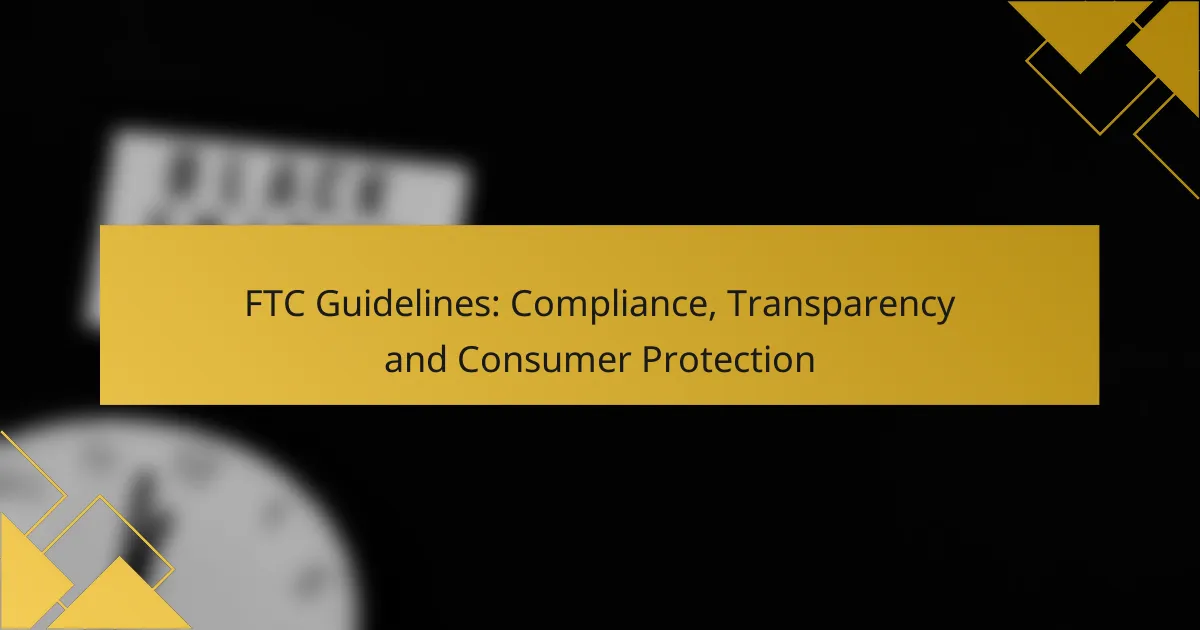Understanding tax implications is crucial for both individuals and businesses, as it encompasses reporting requirements, available deductions, and compliance with tax laws. In the United States, taxpayers must navigate various obligations based on their income type and employment status, which can significantly impact their financial outcomes. By effectively managing deductions and adhering to compliance standards, taxpayers can optimize their tax situations and avoid potential penalties.

What are the tax reporting requirements in the United States?
In the United States, tax reporting requirements vary based on income type and employment status. Most individuals must file an annual income tax return, while some may also need to pay quarterly estimated taxes depending on their earnings.
Annual income tax return
Every year, individuals must file an annual income tax return using Form 1040 or its variants. This document reports total income, deductions, and tax liability for the year, typically due by April 15.
Taxpayers should gather all relevant documents, including W-2s, 1099s, and receipts for deductible expenses. Filing electronically can expedite the process and may lead to faster refunds.
Quarterly estimated taxes
Self-employed individuals and those with significant income not subject to withholding must pay quarterly estimated taxes. These payments are generally due in April, June, September, and January of the following year.
To calculate estimated taxes, individuals should project their annual income and apply the appropriate tax rate. Failing to make these payments can result in penalties and interest charges.
Form 1099 for freelancers
Freelancers and independent contractors receive Form 1099-NEC from clients who pay them $600 or more in a calendar year. This form reports non-employee compensation and must be included in the freelancer’s income tax return.
Freelancers should keep detailed records of all income received, as well as any business-related expenses that can be deducted. Proper documentation can help reduce taxable income and overall tax liability.
W-2 for employees
Employees receive a W-2 form from their employer at the end of each year, detailing wages earned and taxes withheld. This form is essential for filing an accurate income tax return.
Employees should review their W-2 for accuracy, ensuring that all income and withholdings are correctly reported. Any discrepancies should be addressed with the employer promptly to avoid issues with the IRS.

What deductions can individuals claim on their taxes?
Individuals can claim various deductions on their taxes to reduce their taxable income, ultimately lowering their tax liability. The most common deductions include the standard deduction, itemized deductions, business expense deductions, and charitable contributions.
Standard deduction
The standard deduction is a fixed dollar amount that reduces the income on which you are taxed. For the tax year 2023, the standard deduction is approximately $13,850 for single filers and $27,700 for married couples filing jointly.
Choosing the standard deduction simplifies the filing process since you do not need to itemize your expenses. However, it may not be the best option if your total itemized deductions exceed the standard amount.
Itemized deductions
Itemized deductions allow taxpayers to list specific expenses that can lower their taxable income. Common itemized deductions include mortgage interest, state and local taxes, medical expenses, and certain unreimbursed business expenses.
To benefit from itemizing, your total deductions must exceed the standard deduction. Keep thorough records of your expenses to ensure you can substantiate your claims if required by the IRS.
Business expense deductions
Business expense deductions are available for self-employed individuals and can significantly reduce taxable income. Eligible expenses include costs for supplies, equipment, travel, and home office expenses, among others.
It’s crucial to maintain accurate records and receipts for all business-related expenses. The IRS requires that these expenses be both ordinary and necessary for your business operations to qualify for deductions.
Charitable contributions
Charitable contributions allow taxpayers to deduct donations made to qualifying organizations. For cash donations, you can typically deduct up to 60% of your adjusted gross income, while donations of property may have different limits.
Ensure that the organization is recognized by the IRS as a tax-exempt entity to claim the deduction. Keep receipts and documentation of your contributions to support your claims during tax filing or audits.

How does tax compliance work for small businesses?
Tax compliance for small businesses involves adhering to federal, state, and local tax laws, which include accurate reporting of income and expenses, timely payment of taxes, and maintaining proper records. Understanding these requirements can help avoid penalties and ensure smooth operations.
Business structure impacts compliance
The legal structure of a small business—whether it’s a sole proprietorship, partnership, LLC, or corporation—significantly affects tax compliance obligations. Each structure has different reporting requirements and tax rates, which can influence overall tax liability.
For instance, sole proprietors report income on their personal tax returns, while corporations must file separate tax returns. Choosing the right structure can optimize tax benefits and simplify compliance.
Sales tax collection requirements
Small businesses must understand their sales tax obligations, which vary by state and locality. Generally, businesses that sell goods or certain services are required to collect sales tax from customers and remit it to the appropriate tax authority.
To comply, businesses should register for a sales tax permit, track sales accurately, and file returns on a regular basis, often monthly or quarterly. Failure to collect or remit sales tax can lead to significant penalties.
Payroll tax obligations
Payroll tax compliance is crucial for small businesses with employees, as it involves withholding and remitting federal and state income taxes, Social Security, and Medicare taxes. Employers are responsible for accurately calculating these amounts and ensuring timely payments to tax authorities.
To avoid issues, businesses should maintain detailed payroll records, stay updated on tax rates, and consider using payroll software or services. Regular audits of payroll processes can help identify and rectify any compliance gaps.

What are the penalties for tax non-compliance?
Penalties for tax non-compliance can significantly increase the amount owed to tax authorities, impacting both individuals and businesses. These penalties typically arise from failing to file returns, not paying taxes owed, or inaccuracies in reported information.
Failure to file penalties
When taxpayers do not file their tax returns by the due date, they may face failure to file penalties. In the United States, this penalty can be as high as 5% of the unpaid tax for each month the return is late, up to a maximum of 25%. For example, if you owe $1,000 and file three months late, you could incur a penalty of $150.
It’s crucial to file even if you cannot pay the full amount owed, as the failure to file penalty is generally more severe than the failure to pay penalty. Taxpayers should consider filing for an extension to avoid these penalties, but they must still pay any estimated taxes owed by the original deadline.
Failure to pay penalties
Failure to pay penalties apply when taxpayers do not pay their tax liability by the due date. In the U.S., this penalty is typically 0.5% of the unpaid tax per month, which can accumulate to 25% over time. For instance, if you owe $1,000 and pay two months late, you could face a penalty of $10.
Taxpayers can minimize these penalties by paying as much as possible by the due date and setting up a payment plan with the IRS if they cannot pay in full. This proactive approach can help reduce the financial burden of late fees.
Accuracy-related penalties
Accuracy-related penalties occur when taxpayers underreport their income or claim excessive deductions, leading to a tax understatement. In the U.S., this penalty can be 20% of the underpayment amount. For example, if you report $5,000 less in income than you earned, the penalty could be $1,000.
To avoid these penalties, taxpayers should maintain accurate records and double-check their returns for errors before submission. Consulting with a tax professional can also help ensure compliance and accuracy in reporting.

How can taxpayers prepare for tax season?
Taxpayers can prepare for tax season by organizing their financial documents and utilizing tax preparation tools effectively. This proactive approach helps ensure accurate reporting and maximizes potential deductions.
Organizing financial records
To prepare for tax season, start by gathering all relevant financial records, including income statements, receipts, and previous tax returns. Organizing these documents can simplify the filing process and help identify potential deductions.
Consider creating a checklist of necessary documents, such as W-2s, 1099s, and proof of expenses. Keeping these records in a dedicated folder or digital format can save time and reduce stress as the deadline approaches.
Using tax preparation software
Tax preparation software can streamline the filing process by guiding users through each step and ensuring compliance with current tax laws. Many programs offer features like automatic calculations and e-filing options, which can expedite the submission process.
When choosing software, look for options that fit your specific needs, such as support for itemized deductions or investment income. Some popular choices include TurboTax, H&R Block, and TaxAct, which often provide free versions for simple tax situations.









